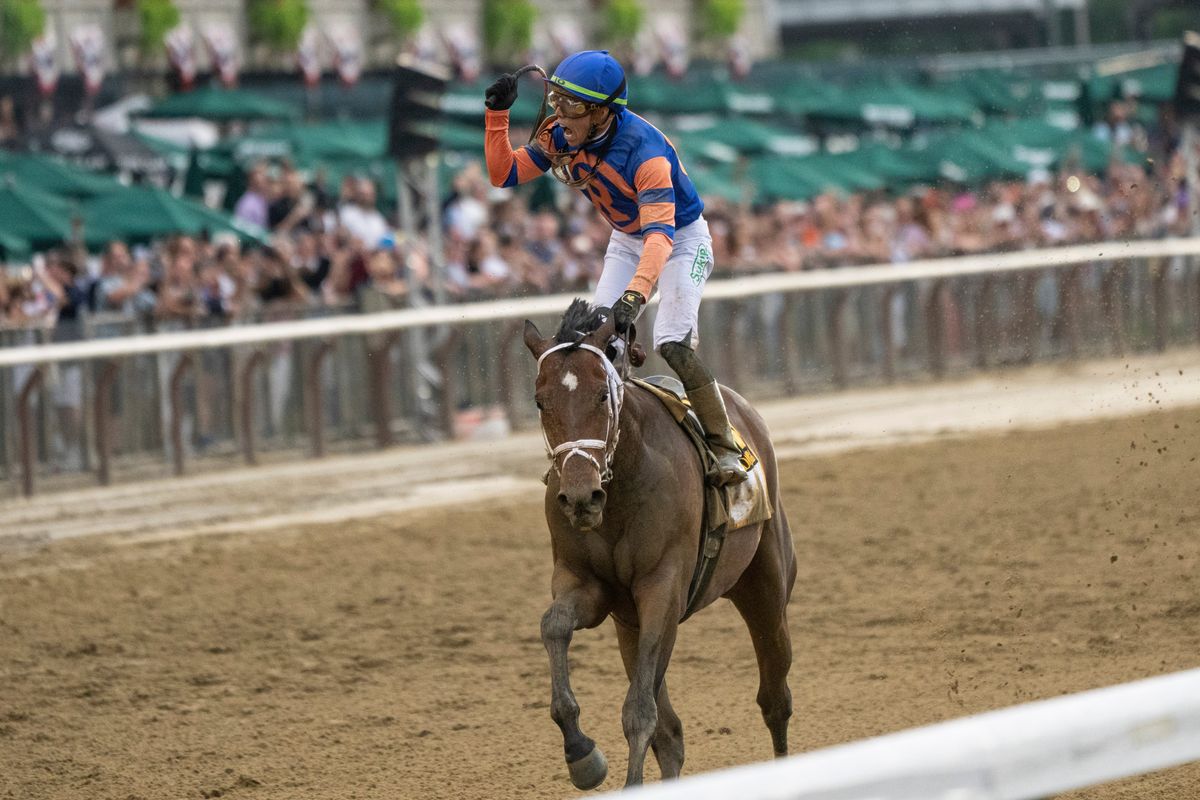Mo Donegal wins the Belmont, closing a varied triple crown season

So, fairy tales do not have legs in horse racing.
If they did, Sonny Leon aboard Rich Strike would have been ding-donging down the stretch of the 154th running of the Belmont Stakes on Saturday.
Instead, a colt named Mo Donegal, trained by New York-based trainer Todd Pletcher and ridden by the nation’s top rider – another New Yorker, Irad Ortiz Jr. – made sure the trophy for what is known as the Test of the Champion stayed home.
The results attest to the mundane nature of the final leg of the Triple Crown: Mo Donegal lived up to his status as a nearly 3-1 favorite, finishing the 1½-mile marathon in a final time of 2 minutes, 28.29 seconds. The colt paid its backers $7.20 for a $2 bet and rewarded its owners Donegal Racing and Repole Stable with an $800,000 check for first place.
Mo Donegal left little doubt that he was the best horse Saturday. He blew past the early pacesetter We the People in the stretch and held off stablemate Nest, a filly, for an easy three-length victory. Skippylongstocking was a distant third.
“I thought both horses were traveling really great the whole way,” Pletcher said. “The one thing I told Irad was to be patient, and I think he got the best trip in the race.”
Rich Strike ran in the back of the pack and never found the gut-busting gear that powered him down the stretch of Churchill Downs and to victory at impossible 80-1 odds. He was ridden again by Leon, a little-known jockey from the Midwest-grits-and-hard-toast circuit who had thrown down a masterpiece of big-time race riding at Churchill Downs – a swerving, rail-skimming trip worthy of a tear of appreciation from the Mona Lisa.
His unlikely victory captivated sports fans who were taken by the colt’s humble beginnings. He was bought for $30,000 out of a claiming race by an owner who had only one horse in training: Rich Strike. Eric Reed, the horse’s trainer, and Leon were accomplished horsemen who had won plenty of races but were not widely known because their successes came mostly at the casino racetracks in Ohio, Kentucky and West Virginia.
Reed took the blame for Rich Strike’s lackluster finish at Belmont Park. He had asked Leon to keep the colt off the rail and take him wide for a stretch run down the middle of the racetrack.
Why, especially after Leon and Rich Strike hugged the rail in Kentucky and flashed by Epicenter and Zandon in the race’s final yards?
Reed did not really have an explanation.
“We were hoping we could have been a little closer and our pace was slow,” Reed said. “Our biggest change was deciding to stay a little off the rail and try to give him a good, open run where he could take off.”
But Reed saw that was a mistake in the backstretch when his colt was fighting Leon and was trying to bull his way to the rail.
“The whole way, his head turned and he was trying to get to the inside. I guess we made a mistake not putting him on the fence,” Reed said.
Ortiz, aboard Mo Donegal, knew he had plenty of horse. He had been working the colt in the morning and had already won twice on the late runner.
“I liked him every time I got on him,” he said.
Uplifting stories have been hard to come by in America’s oldest sport these days. Bob Baffert, who trained Medina Spirit – last year’s Derby winner until he was disqualified for failing a post race drug test – had kept horse racing in the news by contesting the penalty. In April, Baffert was sidelined for the Triple Crown by a 90-day suspension from Kentucky regulators.
This Triple Crown season needed a break from Baffert and the controversies that accompanied him. He has won six Derbys and swept the Triple Crown twice in the past seven years. But he has had persistent troubles in the test barn – 30 drug tests failed by his horses over four decades, including four in a 13-month period leading up to Medina Spirit’s failed Derby test.
The victory of Rich Strike on the first Saturday in May was an antidote to Baffert and horse racing’s ongoing rap as an unfair and unsafe sport.
Two weeks later at the Preakness, which Early Voting won, newer personalities took a turn in the spotlight. The colt’s owner, hedge fund investor Seth Klarman, a Baltimore native, celebrated his 65th birthday at Pimlico Race Course, a few blocks from where he grew up. He chose to keep Early Voting in his barn for the Belmont.
It may not have been the best ending for horse racing’s annual five weeks of fame, but it was an honest one. For that, anyone who believes in horse racing is grateful.